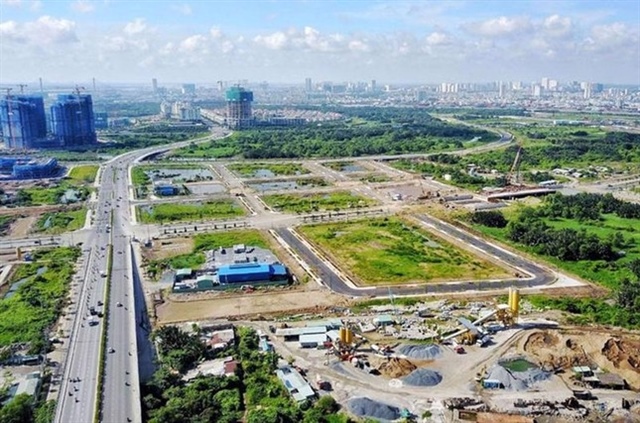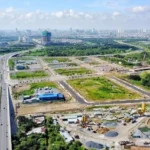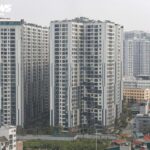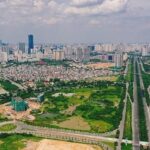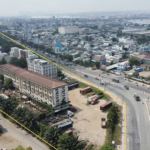Land use fees in a state of flux?
“We are willing to pay taxes and fees as regulated, but the challenge is that there is no clear formula for land use fees at present,” shared Mr. Nguyen Van T., representing a prominent real estate company in Hai Duong. “The process of land price determination often takes months, causing project delays, increased financial costs, and heightened risks.”
According to Mr. T., this situation not only hinders the timely implementation of projects but also drives up housing prices, making them unaffordable for the majority of the population.
An investor in a large urban project in Phu Tho province shared, “I feel like the land use fees are unpredictable. I have a project spanning hundreds of hectares, and the land was allocated in different phases. The land use fee for Phase 1 was calculated, but the fee for Phase 2 turned out to be several times higher, leaving us stunned. With such high land use fees, it will be challenging to complete the project without significantly increasing the selling price.”
According to this investor, the land use fee for Phase 1 was temporarily calculated at VND 12 million/m2, but it soared to VND 60 million/m2 for Phase 2, leaving the company bewildered.
Dr. Nguyen Van Dinh, Chairman of the Vietnam Real Estate Brokers Association, stated that many companies with projects are unable to proceed due to bottlenecks in calculating land use fees. Numerous completed projects cannot be sold as they await the fulfillment of financial obligations. The risks associated with high land use fees are ever-present.
Moreover, when a project extends for several years, or even decades, before the land use fee is determined, it increases the costs for businesses. During the waiting period, companies continue to bear interest expenses and opportunity costs.
Notably, for projects that were subject to provisional land use fee calculations in the past, businesses now face significant challenges regarding additional payments, which exceed initial estimates. Consequently, some businesses have been unable to fulfill their financial obligations due to unforeseen increases in land use fees.
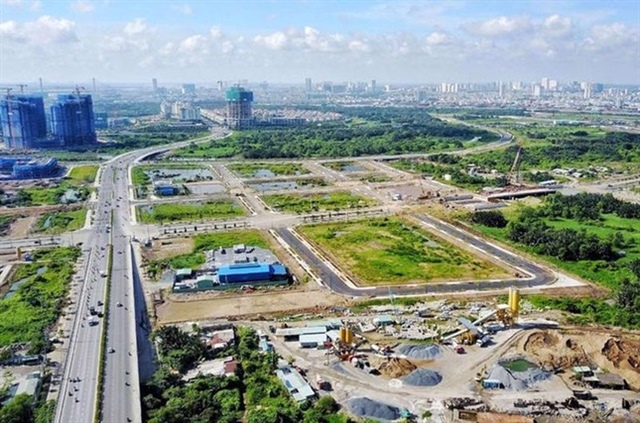 Businesses struggle with high land use fees. |
Land use fees constitute a significant portion of real estate development costs. When these fees increase, developers have no choice but to consider adjusting selling prices. Meanwhile, in major cities, especially in Hanoi, real estate prices have consistently reached new highs.
Regulations on supplementary land use fee payments are unsatisfactory
On May 26, 2025, the Ministry of Finance announced a draft decree amending and supplementing several articles of Decree No. 103/2024/ND-CP, dated July 30, 2024, and Decree No. 104/2024/ND-CP, dated July 31, 2024, regarding land use fees, land rent, and the Land Development Fund.
The draft retains the regulation that cases with decisions on land allocation, land lease, land use purpose conversion, conversion from land lease with annual payments to one-time payments, detailed planning adjustments, etc., but without land price decisions, must pay supplements for the period without land use fee or land rent payments. The collection rate is set at 5.4%/year, calculated based on the payable amount.
Sharing his opinion on supplementary land use fees, Mr. Le Hoang Chau, Chairman of the Ho Chi Minh City Real Estate Association, stated that the regulation on supplementary land use fee payments is not entirely satisfactory for businesses, especially in cases where businesses “agree to acquire land use rights” to implement investment projects. The reason is that real estate and commercial housing project investors are not at fault when government agencies have not issued land price decisions or when land price schemes have not been submitted to the People’s Committees with competent authority.
“Recently, a real estate investor in Thu Duc was stunned to receive a notification that the land use fee for their project exceeded VND 300 billion. Previously, the estimated land use fee was over VND 50 billion. As the investor needed funds for business operations, they had sold some products to customers based on prices calculated with the temporary land use fee,” Mr. Chau illustrated.
Currently, the cost of land use fees has increased to five times the initial estimate. This dilemma leaves the investor in a difficult position, as selling at the old price would result in significant losses, while increasing the price to ensure profitability would make the selling price uncompetitive in the market.
Therefore, legal experts propose amending “Point d, Clause 2, Article 257” to exclude the supplementary payment for the period without land price determination. This amendment is necessary to prevent businesses from incurring substantial expenses, which would lead to higher real estate prices.
Ngoc Mai
“Experts Denounce Supplementary Land Use Fee Collection as Unreasonable: Delayed Land Valuation Not the Fault of Enterprises”
“The recent regulation mandating supplementary land-use fee payments has been deemed unreasonable by experts. They argue that delays in land price determination are often due to bureaucratic lag rather than enterprise inaction. This discrepancy highlights the need for a more nuanced approach that considers the complexities involved in land valuation and enterprise operations.”


























